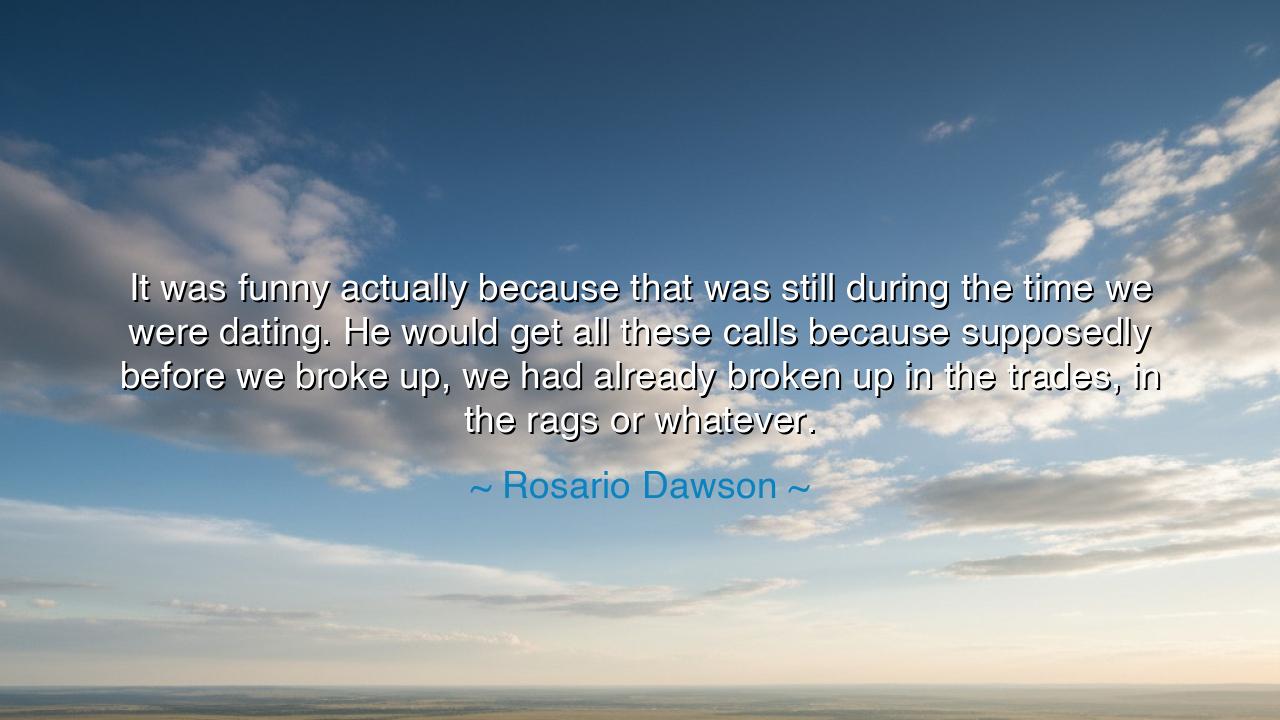
It was funny actually because that was still during the time we
It was funny actually because that was still during the time we were dating. He would get all these calls because supposedly before we broke up, we had already broken up in the trades, in the rags or whatever.






In the rueful laugh of Rosario Dawson—“It was funny actually because that was still during the time we were dating. He would get all these calls because supposedly before we broke up, we had already broken up in the trades, in the rags or whatever”—we hear the old clash between private truth and public tale. The line smiles to keep from wincing. It says: the heart was still keeping time, yet the paper clocks had already struck midnight. In this collision, we learn how swiftly rumor usurps sovereignty, how a headline can declare an ending that the lovers themselves have not consented to live.
The ancients would have known this danger by other names. In marketplaces and courts, rumor walked with a thousand tongues. What is new is not the rags—the tabloids—but the speed with which they enthrone themselves as oracles. Dawson’s words reveal a grim inversion: the couple becomes a footnote to their own story; the trades—the industry sheets, the whispering columns—become the authors. Hence the stream of calls: friends, agents, strangers seeking confirmation of a fiction that has already made its money. Reality must now dispute a counterfeit stamped in ink.
There is a deeper ache beneath the quip. To say the split happened before it happened is to confess that life under observation can be forcibly edited. The private daily tenderness—the untelevised errands, the ordinary apologies—cannot compete with the spectacle of a “break.” Thus reputation outruns recollection; memory must negotiate with rumor. The lovers still speak one grammar; the audience demands another. The result is a surreal doubleness: one is together at the table, and simultaneously broken up on the newsstand.
History keeps parallels like cautionary lamps. In imperial Rome, the Acta Diurna—public notices and gossip—could bless or blight a household overnight; in Restoration London, pamphleteers profited by inventing scandals that patrons later “remembered” as truth. Or recall Princess Diana, whose real hours were perpetually contradicted by printed ones; her relationships became serialized without her consent. The pattern endures: once a narrative sells, it colonizes perception. It is not the palace or the studio that decides the mood of the crowd, but the stall that cries loudest.
Yet there are counter-stories that restore dignity. Consider Audrey Hepburn, who ring-fenced parts of her life against the curiosity economy; or Keanu Reeves, who starved the rumor mills by refusing to feed them—no play-by-play, no performative confessionals, only work public, heart private. Their example teaches what Dawson’s sentence implies: control may be impossible, but stewardship is not. One cannot halt the trades from printing, but one can choose when to answer, how to answer, and how much of the soul to leave unphotographed.
From this, a lesson fit to be handed down: keep the hearth-fire of your relationships away from the marketplace wind. Speak of values in public; keep the delicate particulars for those who will sit with you when the papers lose interest. Refuse to let strangers timestamp your intimacies. If the world insists that something has ended, let the truth be measured not by their chorus but by your fidelity to each other—until, if an ending must come, it is spoken by your tongues and not theirs.
Practical counsel follows. (1) Establish a shared boundary at the beginning: what we tell, what we keep, who may speak for us. (2) When rumors rise, answer once—brief, humane, and without blame—or not at all; do not rehearse the hurt for the crowd. (3) Build a circle of first hearers—family, a few friends—so that when the calls come, the people who matter already know the living truth. (4) Keep rituals that root you in reality—shared meals, walks without phones, letters on paper—so the relationship has weight heavier than rumor’s paper crown. In this way, even if the rags declare you broken up before you are, your hearts will know their own calendar, and your life will not be authored by those who only sell its shadows.






AAdministratorAdministrator
Welcome, honored guests. Please leave a comment, we will respond soon